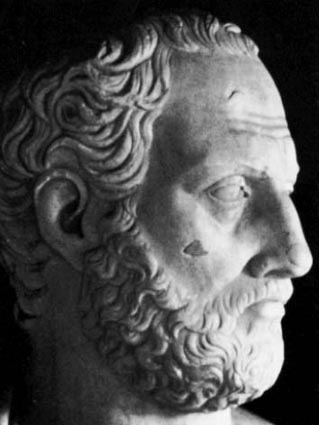Time and Location 
Tuesday Periods 9011, Flint 115
Course Description
Writing at the height of the Athenian empire and witnessing its precipitous fall, Thucydides has left a subtle and complex account, with which one must first come to terms in any attempt to understand the history of fifth-century Greece. Through a close study of his narrative, this course examines the impact of the Peloponnesian War on the Greek world, with particular emphasis on Thucydides’ methods and views, the origin of the war, Periclean strategy, and the growth and collapse of the Athenian empire. In addition to gaining a familiarity with Thucydidean prose, students will consider his writing within the historiographical tradition, ancient and modern.
Required Texts
- K. J. Dover, ed., Thucydides: Book VI (Bristol: Bristol Classical Press, 2002).
- D. Kagan, The Peloponnesian War (New York: Penguin, 2004).
- E. Marchant, ed., Thucydides: Book 1 (London: Duckworth Publishers, 2002).
- J. S. Rusten, ed., Thucydides: The Peloponnesian War II (Cambridge: Cambridge University Press, 1989).
Additional Readings
- Required books are on reserve in Library West.
- Articles are online on the course’s e-reserves page
- Web links to library resources are accessible off-campus only if you use the UF VPN or the Libary Proxy. For more information on how to connect to the library from off-campus, click here.
Course Requirements
- Weekly Assignments, approximately 5 OCT pages.
- Class Participation (5%) based on attendance, participation in discussions, and translation of weekly assignments.
- Presentations (5%) on classical scholarship. Each student will be assigned a selection of scholarly articles and books to read and prepare a report to the class that will provide an overview of the arguments, summary of the evidence, and an analysis of the strengths and weakness of the theories advanced in the literature.
- Three Hourly Examinations (30% each): February 12, March 25; April 28.
Grading Scale
A = 90-100%
B+= 87-89.9%
B = 80-86.9%
C+ = 77-79.9%
C = 70-76.9%
D+ = 67-69.9%
D = 60-66.9%
E < 59.9%
Schedule
January 8: Introduction
January 15: Thucydides 1.1-10; Kagan, chapters 1-3
January 22: 1.11-23; Kagan 4-6
January 29: 1.66-73; Kagan 7-9
February 5: 1.74-82; Kagan 10-12
February 12: 1.83-88; Test 1
February 19: 1.139-46; Kagan 13-15
February 26: 2.34-41; Kagan 16-18
March 4: 2.42-51; Kagan 19-21
March 11: Spring Break
March 18: 2.52-62; Kagan 22-24
March 25: 2.63-65; Test 2
April 1: 6.8-15; Kagan 25-27
April 8: 6.16-22; Kagan 28-30
April 15: 6.23-32; Kagan 31-33
April 22: 7.60, 69-72; Kagan 33-Conclusion
April 28: Final Exam
Presentations
January 15: The Archaeology
- Virginia Hunter, Past and Process in Herodotus and Thucydides, Part 1
- J.R. Ellis, “The Structure and Argument of Thucydides’ Archaeology,” CA10 (1991) 344–80
January 22:Thucydides Historical Method
- Readings TBA
January 29: Thucydides and Narrative (Part 1)
- Tim Rood, Thucydides and Narrative Explanation
February 5: Thucydides and Power
- Lisa Kallet-Marx, Money, Expense, and Naval Power in Thucydides’ History 1-5.24
February 19: Causes of the Peloponnesian War
- G.E.M. de Ste Croix, The Origins of the Peloponnesian War
February 26: The Funeral Oration
- Nicole Loraux, The Invention of Athens
March 4: Thucydides and Political Realism (Part 1)
- Gregory Crane, Thucydides and the Ancient Simplicity: The Limits of Political Realism
March 18: Thucydides and Political Realism (Part 2)
- Clifford Orwin, The Humanity of Thucydides
April 1: The Impact of the War
- Jonathan Price, Thucydides and the Internal War
April 8: Thucydides and Narrative (Part 2)
- Carolyn Dewald, Thucydides’ War Narrative: A Structural Study
April 15: The Philosophy of History
- Darien Shanske, Thucydides and the Philosophical Origins of History
April 22: An Anthropologist’s Perspective
- Marshall Sahlins, Apologies to Thucydides: Understanding History as Culture and Vice Versa